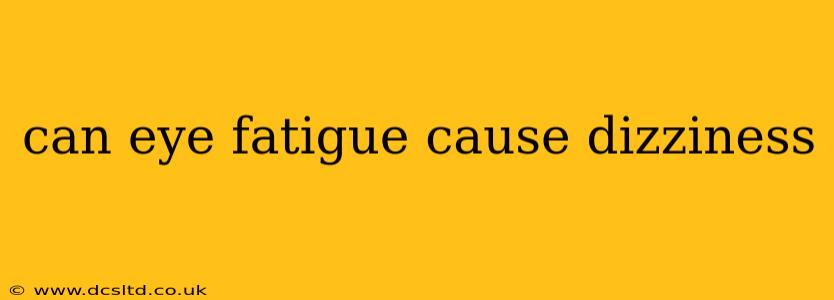Eye fatigue, that persistent feeling of tired, strained eyes, is a common complaint in today's digital age. But did you know it can sometimes lead to a surprising symptom: dizziness? While not always directly causal, eye strain can contribute to feelings of vertigo and imbalance, making it crucial to understand the connection. This article explores the relationship between eye fatigue and dizziness, answering common questions and offering strategies for relief.
How Can Eye Strain Lead to Dizziness?
The connection between eye fatigue and dizziness isn't always straightforward. It's not a direct cause-and-effect relationship like a fever causing a headache. Instead, the link is more nuanced and often involves the complex interplay of your visual system and your vestibular system – the part of your inner ear responsible for balance.
When your eyes are strained, they work harder to focus, leading to increased muscle tension around the eyes and head. This tension can trigger headaches, and in some cases, it can affect the signals sent to your brain from your vestibular system, leading to feelings of dizziness or vertigo. This is particularly true if you already have underlying vestibular issues.
Furthermore, prolonged eye strain can contribute to a condition called asthenopia. Asthenopia encompasses a range of symptoms including blurred vision, headaches, eye pain, and – you guessed it – dizziness. The exact mechanism isn't fully understood, but it's believed that the constant strain on the eye muscles disrupts the delicate balance between your visual and vestibular systems.
What are the Symptoms of Eye Strain-Related Dizziness?
Experiencing dizziness alongside eye strain might manifest in several ways. These symptoms can range in severity and may include:
- Lightheadedness: A general feeling of faintness or unsteadiness.
- Vertigo: A sensation of spinning or the room moving around you.
- Imbalance: Difficulty maintaining your balance, especially when standing or walking.
- Nausea: Feeling sick to your stomach.
- Headaches: Often tension headaches localized around the eyes and temples.
- Blurred vision: Difficulty focusing or seeing clearly.
- Eye pain or discomfort: A burning, aching, or gritty sensation in the eyes.
Does Eye Strain Always Cause Dizziness?
No, eye strain doesn't always cause dizziness. Many people experience eye fatigue without experiencing any dizziness. However, individuals with pre-existing conditions affecting their balance, such as vestibular disorders or migraines, may be more susceptible to experiencing dizziness as a result of eye strain. The severity of the eye strain also plays a role; mild eye strain is less likely to cause dizziness compared to prolonged or severe strain.
How Can I Tell if My Dizziness is Due to Eye Strain?
Differentiating dizziness caused by eye strain from dizziness stemming from other causes can be challenging. If your dizziness is accompanied by other symptoms of eye strain, such as headaches, blurred vision, or eye pain, it's more likely related to eye fatigue. However, it's crucial to see an ophthalmologist or optometrist for a proper diagnosis. They can rule out other potential causes of dizziness, such as inner ear problems, neurological conditions, or cardiovascular issues.
How to Relieve Eye Strain and Associated Dizziness?
If you suspect your dizziness is linked to eye strain, consider these strategies for relief:
- The 20-20-20 rule: Every 20 minutes, look at an object 20 feet away for 20 seconds.
- Regular breaks: Take frequent breaks from screen time, especially during prolonged periods of computer work or screen usage.
- Adjust screen settings: Ensure proper brightness and contrast on your screens.
- Improve lighting: Ensure adequate lighting in your workspace to reduce eye strain.
- Eye exercises: Practice simple eye exercises to relax and strengthen your eye muscles.
- Hydration: Drink plenty of water to keep your eyes and body hydrated.
- Healthy diet: A balanced diet rich in antioxidants can contribute to eye health.
- Sleep: Ensure you get enough sleep; sleep deprivation can exacerbate eye strain.
- Consult a professional: See an ophthalmologist or optometrist for a comprehensive eye exam and personalized advice.
Disclaimer: This information is for general knowledge and informational purposes only, and does not constitute medical advice. It is essential to consult with a qualified healthcare professional for any health concerns or before making any decisions related to your health or treatment.
